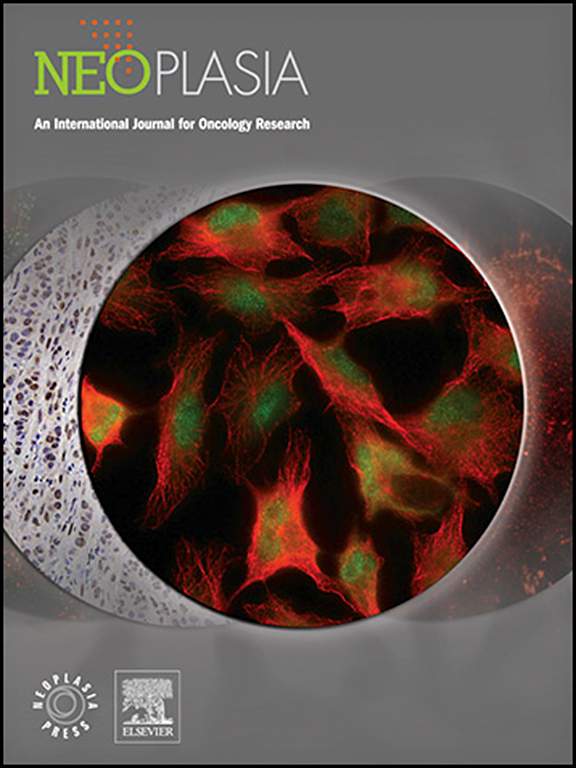Proteomic analysis uncovers biological diversity in molecularly defined endometrial carcinomas
IF 7.7
2区 医学
Q1 Biochemistry, Genetics and Molecular Biology
引用次数: 0
Abstract
While endometrial cancer has an overall favorable prognosis, some patients have poor outcomes and may benefit from further refinements of the current classification systems. Molecular classification stratifies endometrial cancer patients into four prognostic subtypes: POLEmut, MMRd (mismatch repair deficient), p53abn, and NSMP (no specific molecular profile), where patients with POLEmut have the best prognosis and p53abn has the worst prognosis. We used proteomic profiling to assess if additional prognostic or predictive information could be identified across or within molecular subtypes. Global proteome profiling of formalin fixed, paraffin embedded samples, that had clinicopathologic and outcome data, was performed on 184 endometrial cancers encompassing all four molecular subtypes, including replicate samples of the same tumor, and both biopsy and final hysterectomy specimens. To ensure representation of each subtype, we profiled an approximately equal distribution in the 148 unique tumors; 34 (23%) POLEmut, 40 (27%) MMRd, 35 (24%) p53abn and 39 (26%) NSMP, rather than the population-based distributions. There was high reproducibility in the proteomic profiles of intra-tumor replicate samples, and between matched biopsy and hysterectomy tumor samples. Consensus clustering identified four clusters with different prognosis, named ‘Adhesion’, ‘Immune’, ‘Proliferation’, and ‘Metabolic’ based on the functional characteristics of the enriched proteins. We associated protein expression features with common mutations, molecular subtype, and outcomes. These results demonstrate the biologic diversity within endometrial cancers, both between and within molecular subtypes, and provide candidate features for functional and clinical investigation.
蛋白质组学分析揭示了分子定义的子宫内膜癌的生物多样性。
虽然子宫内膜癌总体预后良好,但一些患者预后较差,可能会从当前分类系统的进一步改进中受益。分子分类将子宫内膜癌患者分为四种预后亚型:POLEmut、MMRd(错配修复缺陷)、p53abn和NSMP(无特异性分子谱),其中POLEmut患者预后最好,p53abn患者预后最差。我们使用蛋白质组学分析来评估是否可以跨分子亚型或在分子亚型内识别额外的预后或预测信息。对184例子宫内膜癌进行了福尔马林固定、石蜡包埋样本的整体蛋白质组分析,这些样本包含所有四种分子亚型,包括同一肿瘤的重复样本、活检样本和最终子宫切除术样本。为了确保每个亚型的代表性,我们在148个独特的肿瘤中描绘了一个近似相等的分布;POLEmut 34例(23%),MMRd 40例(27%),p53abn 35例(24%)和NSMP 39例(26%),而不是基于人群的分布。肿瘤内复制样本的蛋白质组学图谱以及匹配的活检和子宫切除术肿瘤样本之间的蛋白质组学图谱具有很高的可重复性。基于富集蛋白的功能特征,共识聚类确定了四个不同预后的聚类,分别命名为“粘附”、“免疫”、“增殖”和“代谢”。我们将蛋白表达特征与常见突变、分子亚型和结果联系起来。这些结果证明了子宫内膜癌分子亚型之间和内部的生物多样性,并为功能和临床研究提供了候选特征。
本文章由计算机程序翻译,如有差异,请以英文原文为准。
求助全文
约1分钟内获得全文
求助全文
来源期刊

Neoplasia
医学-肿瘤学
CiteScore
9.20
自引率
2.10%
发文量
82
审稿时长
26 days
期刊介绍:
Neoplasia publishes the results of novel investigations in all areas of oncology research. The title Neoplasia was chosen to convey the journal’s breadth, which encompasses the traditional disciplines of cancer research as well as emerging fields and interdisciplinary investigations. Neoplasia is interested in studies describing new molecular and genetic findings relating to the neoplastic phenotype and in laboratory and clinical studies demonstrating creative applications of advances in the basic sciences to risk assessment, prognostic indications, detection, diagnosis, and treatment. In addition to regular Research Reports, Neoplasia also publishes Reviews and Meeting Reports. Neoplasia is committed to ensuring a thorough, fair, and rapid review and publication schedule to further its mission of serving both the scientific and clinical communities by disseminating important data and ideas in cancer research.
 求助内容:
求助内容: 应助结果提醒方式:
应助结果提醒方式:


